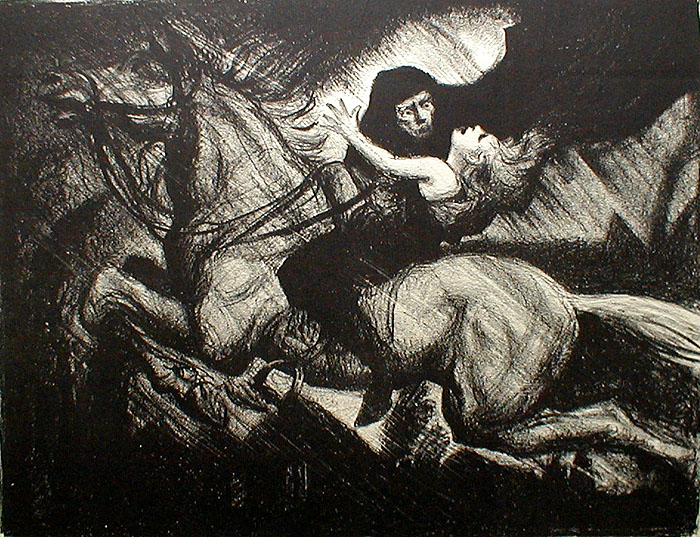
The Bloody Chamber - Angela Carter
"The Erl-King"
Summary
The heroine, who speaks directly to the audience, tells the story of "The Erl King." The scene opens on the late October forest, which has an air impending death. The woods are desolate and unwelcoming to people, because there are no manmade tracks to follow there. According to the narrator, the woods are not a place of illusion as fairy-tales make us believe; rather, in the woods, "everything ... is exactly as it seems." We, like Red Riding Hood, get "trapped in [our] own illusion[s]" because "it is easy" for us to "lose ourselves" in the woods.
The narrator describes walking through the woods alone, not realizing that the cold wind she feels is the Erl-King's harbinger, or that the elder-bird call she hears is the sound of the Erl-King's pipe. She warns, "The Erl-King will do you grievous harm." The narrator steps into a "darkening clearing" where the Erl-King sits among the forest creatures, which seem to belong to him. The Erl-King touches her with "his irrevocable hand" and shows her the ways of the forest.
The Erl-King lives alone in a one-room hut in the middle of the forest. He eats plants, milk from his goat, and sometimes animals. His eyes are eerily green, "as if from too much looking at the wood" and the narrator warns, "there are some eyes can eat you." She says that the Erl-King is not a hermit but rather a being that "came alive from the desire of the woods." Despite his rustic ways, the Erl-King keeps his home impeccably clean; in fact, the narrator describes it as "musical and aromatic." Herbs hang on the walls along with dozens of caged, singing birds and a string-less fiddle, and a fire burns perpetually in the hearth.
Ever since the narrator met the Erl-King, she has visited him to learn his ways and make love to him. When he wants to see her, he calls her to the woods with his birdcall. He likes to proclaim, "skin the rabbit" as he undresses her. When he makes love to her, he bites her neck. The narrator says she is not afraid of the Erl-King himself, who lives in harmony with nature; she is afraid only of the way he throws her senses off-balance. She calls this feeling "the vertigo with which he seizes me." He makes her feel as though she is a bird falling out of the sky, out of the power of the Earth's gravity and into his.
The narrator evokes the story of Red Riding Hood again when she declares, "What big eyes you have." She feels as though she will become trapped in the Erl-King's stare like an insect in amber. Then she discovers that he is weaving a cage for her. She is terrified because, although she loves the Erl-King, she does not wish to live in a cage. She knows that she will die if he cages her; she reminds us, "I knew from the first moment I saw him how Erl-King would do me grievous harm." The narrator realizes that the Erl-King's birds do not actually sing, but rather wail because they are trapped and lost. They "cry because they can't find their way out of the wood, have lost their flesh when they were dipped in the corrosive pools of [The Erl-King's] regard and now must live in cages."
The narrator ends her story by describing her plan to kill the Erl-King. She resolves, "I shall take two huge handfuls of his rustling hair as he lies half dreaming, half waking ... I shall strangle him with them." Suddenly, the story shifts to third person. This new narrator says that our heroine will free all the birds, which will turn back into lost girls, "each one with the crimson imprint of [the Erl-King's] love-bite on their throats." She will then cut off his hair and use it to string his old fiddle. The fiddle will then play of its own accord, "Mother, mother, you have murdered me!"
No comments:
Post a Comment